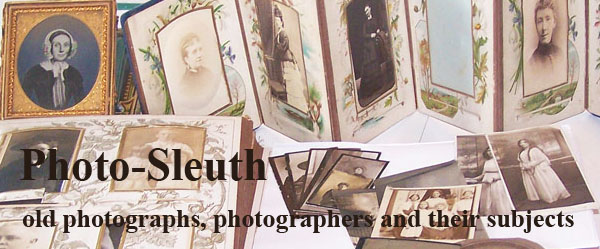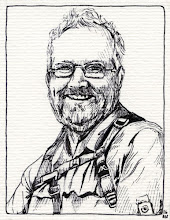
At the time I had no idea of the location, but suspected it was somewhere in Derbyshire, and perhaps formed a suitable watering hole and starting point for excursions by walkers and fly-fishermen. More recently I was going over some notes made by my Dad in 2002, and came across the following:
... in J.B. Firth's "Highways & Byways in Derbyshire" where CVP pencilled many marginal asterisks and underlined passages which caught his eye, e.g. Apropos Beresford Dale: "... for peaceful loveliness and sheer prettiness nothing in Derbyshire excels it." ... As far as I know, fishing was his (CVP's) only outdoor pursuit in later years, unless you count attending sales all over the place and doing whatever he did at the Cromford Nursery.

Boy fishing, unknown location, undated, Loose paper print
Image © and collection of Brett Payne
I've long known that Charles Vincent was a keen trout fisherman, because my Dad inherited his rods and tackle and, although I was given my own cheap but perfectly adequate split cane rod - probably made in Hong Kong - at a fairly young age, I used an old reel of his, which I carried around in an old Great War gas mask bag brought back from the Western Front by my Grandpa.

Hallam fishing, Upper Waihou River, 27 July 2011
I think my brother Hallam, who has since become a far more knowledgeable and skillful trout fisherman than I, used the old rods until they disintegrated. Not surprising, really, because they must have been all of fifty or sixty years old by then.

Marchant Brooks & Co. auction sale notice, Fishing Rights and Fishing Lodge, Cromford Bridge, 22 July 1947, Collection of Brett Payne
In the 1930s Charles Vincent owned, along with Bow Wood Farm and the Cromford Bridge Chapel, about which I have written previously, a small fishing lodge adjacent to Cromford Bridge and 3000 yards of fishing rights on the River Derwent. He died in 1941 and, after the war had ended, my grandfather Leslie Payne sold Bow Wood Farm. Jobs were scarce at that time, in the post-war economic depression, and it was some time after his demobilisation from the Pioneer Corps before he eventually found a job with Gleeds, the Nottingham quantity surveyors, so money must have been tight. The Lodge and Bridge Chapel were gifted to the Derbyshire Archaeological Society, who I believe still own it.

Fisherman on the River Derwent, near Cromford Bridge
Image © and courtesy of Mick Martin
When the Matlock & Cromford Angling Association invited him to become a vice-president in 1942 they promised there would be "no irksome duties." I don't know if the fishing rights went with it, but Grandpa wasn't much of a fisherman, and from the surviving correspondence in our family archives it appears to have been more trouble than it was worth. Since no keeper had been employed the river had been neglected during the war, compounded by problems with effluent from a nearby fluorspar quarry. It appears that the family's connection with Cromford Bridge and the Derwent ended shortly thereafter.

Richard Arkwright's Fishing Lodge, Cromford Bridge
© Copyright Peter Barr Courtesy of Geograph.co.uk
and licensed for reuse under this Creative Commons Licence
The fishing lodge was originally built in the late 18th Century by Richard Arkwright junior, then living nearby at Willersley Castle, as accomodation for his bailiff. An inscription on the lintel above the doorway - "Piscatoribus Sacrum" - provides a clue to the lodge's origins.

Charles Cotton's Fishing Lodge, Beresford Dale
© Copyright Neil Gibbs Courtesy of Geograph.co.uk
and licensed for reuse under this Creative Commons Licence
It is supposed to have been based on a similarly adorned - but rather more picturesque and architecturally pleasing - lodge built in 1674 on the banks of the River Dove at Beresford Dale by Charles Cotton, and made famous in his friend Isaac Walton's A Compleat Angler, or The Contemplative Man's Recreation.

The Fishing House, Beresford Dale
from Highway and Byways in Derbyshire, by J.B. Firth (1905)
A plate from Firth's 1905 Highway and Byways in Derbyshire, so lavishly annotated by Charles Vincent, displays the temple carefully restored after having been much neglected in previous times.

"Piscatoribus Sacrum," Walton and Cotton's Fishing House, Beresford Dale Postcard by unknown publisher, c.1920s-1930s
That Walton and Cotton's fishing retreat was still a well known landmark in the 1920s and 1930s is evidenced by this postcard, showing it within a couple of metres of the streambank in a particularly tranquil setting. Unfortunately it is on private land, and therefore only visible to the general public from the opposite bank close to where the path from Hartington reaches the river.

Beresford Dale
Postcard 0171 by G. Hill & Sons, c.1920s-1930s
Another postcard view from the same era shows a peaceful scene which is probably little changed from Walton and Cotton's time ...

Land the Trout, Engraving from The Compleat Angler by Izaak Walton and Charles Cotton (4th Edition, 1844)
... and I have little difficulty envisaging Charles Vincent and a friend casting a line or two on these waters, much as those good friends Cotton and Walton had done two and a half centuries before.

Fisherman at Dovedale, c.1850s-1860s
One half of a stereoview by unidentified photographer
Image © and courtesy of John Bradley
Further downstream through Wolfscote Dale the valley deepens considerably, and by the time one reaches Dovedale the vistas might better be described as spectacular than tranquil. Steep, thickly wooded hillsides are punctuated by bare prominences such as Dove Holes, Ilam Rock, Reynard's Cave, Lion Head Rock, Tissington Spires and Lover's Leap.

Fisherman at Dovedale, c.1850s-1860s
One half of a stereoview by Poulton & Son of London
Image © and courtesy of John Bradley
By early Victorian times, a steady stream of day trippers were visiting Dovedale (see previous Photo-Sleuth article, Donkey Rides at Dovedale), and serious anglers no doubt had to plan their excursions a little more carefully to avoid the throngs.

Fisherman heading home with his bag, Dovedale, c.1850s-1860s
One half of a stereoview by John Latham of Matlock Bath
Image © and courtesy of John Bradley
Click image for animated 3-d view
This stereoscopic view shows a fisherman crossing the Stepping Stones over the Dove, at the southern end of Dovedale. He is perhaps on his way home at the end of a pleasant day's outing.

The The Izaak Walton Hotel, Dovedale, c. 1856-1859
One half of a stereoview by Sedgefield (English Scenery No. 720)
Image © and courtesy of John Bradley
He may even have been heading back to the very popular Izaak Walton Hotel, situated close to the entrance to the Dale, shown here in another mid-century stereoview. The entrance on the right hand (eastern facade) of the building looked somewhat familiar ...

The Clarion Cycling Club Easter Meet, Izaak Walton Hotel, Dovedale, 1895
Image © and courtesy of the National Clarion Cycle Club

Wedding at the Isaac Walton Hotel, Dovedale
Image © and courtesy of the The Izaak Walton Hotel
... and a further search for images brought up several which show it in sufficient detail to be able to identify it as the ivy-clad building in front of which Charles Vincent and friends were standing in the photograph displayed at the head of this article. It seems very likely that they were about to spend a pleasant day on the River Dove. Which leaves us with a satisfactory outcome to the quest, and at a convenient point at which to conclude our own brief tour of some of Derbyshire's very pleasant trout fishing spots.
View Cromford Bridge & Dovedale in a larger map
Walton & Cotton's Derbyshire

Cover of Penguin edition of The Compleat Angler, 1939
Image courtesy of A Penguin a Week
Finally, to round off a rather lengthy post, I recently adopted this postcard showing the cover of the 1939 Penguin edition of The Compleat Angler, receiving it under separate cover, and then sending it back with an appropriate trout fishing stamp to postcard collector Emilie Staubs of Massachusetts. A fitting post script to this line of research, I think.








i'm neither keen on fishong nor fish actually, except in sushi, but i've sure enjoyed the scenery, especially that boy fishing, 2nd pciture.
ReplyDelete:)~
HUGZ
Thank you. That's a great photograph, isn't it - it was a purchase amongst a large assorted batch bought blind on eBay ... very lucky.
ReplyDeletea blind purchase????????????????????
ReplyDeleteyou got balls!!
well, of course you do...
you got guts then!!
i'm a big shopper on the internet, but i like to know/see what i'm buying first.
as i said, not big on fishing, but this is something i would have like to own, very powerful image. good 4 you!!
do you often purchase things blindly like that, and does it pay off this nicely?
:)~
HUGZ
Fascinating post Brett, stunning images and fine detective work (as usual). I hadn't heard of fishing lodges before, but will look out for them from now on.
ReplyDeleteTicklebear - Well, I will admit that (a) it wasn't completely blind - the auction listing had an image of a pile of unsorted photos, but nothing that you could see clearly, (b) it was such a low starting price that I put in the minimum bid, won it, and (c) yes I was lucky! The group is almost certainly all from one family, some of whom are identified. A good project to research when I can find the time.
ReplyDeleteLisa B - Well you'll be lucky if you find one, I think they're like hen's teeth, but let me know if you do!
A fine tale of a fishing story. Wonderful examples. especially the stereo-view GIF. Do you suppose that anglers in those days were as fanatic about equipment as they seem today? British anglers always seem to use as much gear as a SWAT team and all for catching something 6inch long.
ReplyDeleteThanks Mike. Well, they don't seem as hampered down with tackle in the old photographs that I've seen. I think there's a lot to be said for going out with what you can carry in your pockets, to be honest.
ReplyDeleteI found this Ambrotype of a gentleman angler today on eBay. Typical gear and with a fish too. Fits very nicely with your post. The same man is in another photo from the seller holding a lute-like instrument.
ReplyDelete19th C Ambrotype Of A Fisherman
Now that's a great find Mike. I'm afraid it will go for a far higher price than I can afford, but it would be nice ....
ReplyDeleteI haven't seen an instrument quite like that before. Are you familiar with it?
Yes I think that is an occupational (recreational?) photograph that will hit $300 or more. The bid has already jumped twice since this morning and it is still early. The other photo will likely go for less, (though they should be kept together for posterity) but it is the more unusual. The gentleman holds a kind of Italian soprano lute, a mandola or mandore I think. Doubled strings similar to a cittern which was a popular English instrument, but an instrument typical of 1550 not 1850.
ReplyDeleteThe man's pose on both photos has the look of not just a gentleman angler/musician, but an academic. But again a mystery photo that will not reveal its secret easily.
You were quite right Mike - after 18 bids it fetched 409 pds!
ReplyDelete